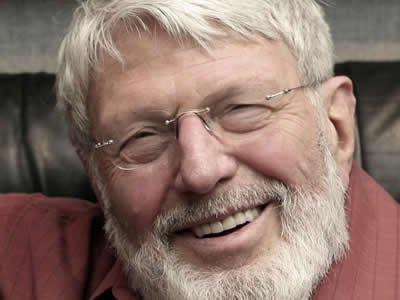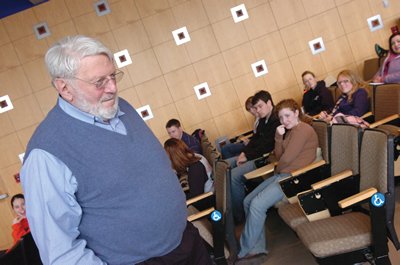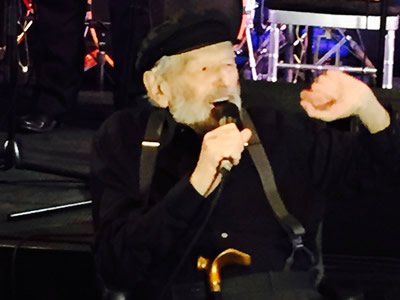University Mourns Loss of Singer, Actor Theodore Bikel
'Versatility was his hallmark,' says A&S Dean Emerita Cathryn R. Newton

Syracuse University is mourning the loss of Theodore “Theo” Bikel, the legendary singer, actor, and activist who was a close friend of the College of Arts and Sciences (A&S)’ for more than a decade. He died on July 21 in Los Angeles at 91.
Bikel (pronounced “bih-KEL”) is remembered for originating the role of Baron von Trapp in the Broadway production of Sound of Music, and for presenting more than 2,000 performances of Tevye in Fiddler on the Roof.
But these accomplishments, says Cathryn R. Newton, A&S’ dean emerita, tell only part of his story.
“Our times with him were unforgettable,” she wrote in an email, hours after his death. “Theo was a consummate performer and caring friend who gave unselfishly to the College of Arts and Sciences. His contributions as a teacher-scholar, performer in many languages, and activist altered the social fabric of society. He was, in the words of one author, a ‘master of versatility.’”
Bikel’s close association with Syracuse began in 2003, when Newton, then dean of A&S, invited him to speak at fall orientation. It was there in Hendricks Chapel that he, with nothing more than a microphone and an acoustic guitar, regaled students with music, humor, and political thought.
“We knew his program would be superb, and wanted to make sure it was our students’ first academic experience,” says Newton, who now serves as a Provost’s Faculty Fellow and the University’s only Professor of Interdisciplinary Sciences. “He quickly established a connection with everyone in the hall, enthralling freshmen and forum leaders alike. It provided a momentous start to the academic year."
Newton was deft in the timing of Bikel’s campus debut. Fresh from the reissue of his acclaimed 1994 autobiography, Theo (University of Wisconsin Press, 2002), he was entering the fourth and final decade of his Tevye run, having completed various film and TV projects, including Crime and Punishment (2002) and JAG (2003), respectively.

“Versatility was Theo’s hallmark,” says Newton, adding that he returned to campus several more times, including once in 2007 to headline an inter-ethnic concert called “Bridge to Peace,” sponsored in part by the Jewish Studies Program in A&S. "Theo exemplified the liberal arts ethos, with his capacity for creativity, imagination, and service. That he traveled the world in myriad guises made him many things to many people.”
Bikel riffed on this point in his book: “I’m sure I could have had a much bigger career had I followed the advice of agents and friends: Stick to one aspect of what you do, and stay in one place to do it—California, for example.” Fortunately, it was not to be.
Bikel's widow, Aimee Ginsburg Bikel—herself an accomplished journalist—sustained him, and enabled him to keep performing through the final stages of his life. She graciously made available to Newton a letter she received from President Obama, which said, in part: “Theo always stayed true to his voice—as a performer and in support of his ideals. Our world is a brighter place thanks to the joy he brought to audiences around the globe and the dedication with which he strove to foster peace and justice among all people.”
An outstanding actor with considerable range, the Viennese-born Bikel starred in more than 40 films, including such classics as The African Queen, The Defiant Ones, and My Fair Lady. He appeared on dozens of television shows, including Law & Order and Murder, She Wrote; performed in countless stage and opera productions, including Zorba and A Streetcar Named Desire (where Sir Laurence Olivier cast him opposite Vivien Leigh); and recorded nearly 30 albums, mostly of Hebrew and Yiddish folk music, showcasing his rich, luscious baritone.
Bikel was a hyper polyglot, who sang in more than 20 languages and portrayed diverse characters and nationalities with relative ease. Edelweiss, which Rodgers and Hammerstein expressly wrote for Bikel, may have been his calling card, but his convincing portrayal of a Russian adoptive father in Star Trek: The Next Generation was how many latter-day audiences knew him. In a video celebrating Bikel’s 90th birthday, Leonard Nimoy implored him, in both English and Yiddish, to “live long and prosper.”

Offstage, Bikel was equally prolific. In addition to presiding over Actors’ Equity, he was a member of the National Council on the Arts, an officer of the American Jewish Congress, and a delegate to the notorious 1968 Democratic National Convention in Chicago. Bikel also hosted a radio show, owned cafes in Hollywood, stumped for various politicians and social causes, and, famously, co-founded the Newport Folk Festival. Numerous musicians, including Bob Dylan, Judy Collins, and Peter, Paul, & Mary, have cited him as an influence.
Bikel’s third wife, musician Tamara Brooks, was a former senior associate dean of the College of Visual and Performing Arts who helped reinforce his Central New York ties. Along with Brooks, who died in 2012, he forged a creative partnership between the University and renowned dancer/choreographer Paul Taylor ’53, H’86 that has continued to this day.
A tireless performer (not even last-minute oral surgery stood in the way of his “Bridge to Peace” concert), Bikel was always comfortable on stage. He took his final bow last June 21 at the New York Film Festival, which coincided with a screening of a new documentary about him and storyteller Sholom Aleichem, narrated by Alan Alda—another actor with Syracuse ties. Newton was in the audience.
“After he and Alan participated in a gorgeous panel discussion, Theo sang at a celebration in an adjacent hall,” she reports. “It was so moving—a true and loving farewell.”
Media Contact
Rob Enslin
